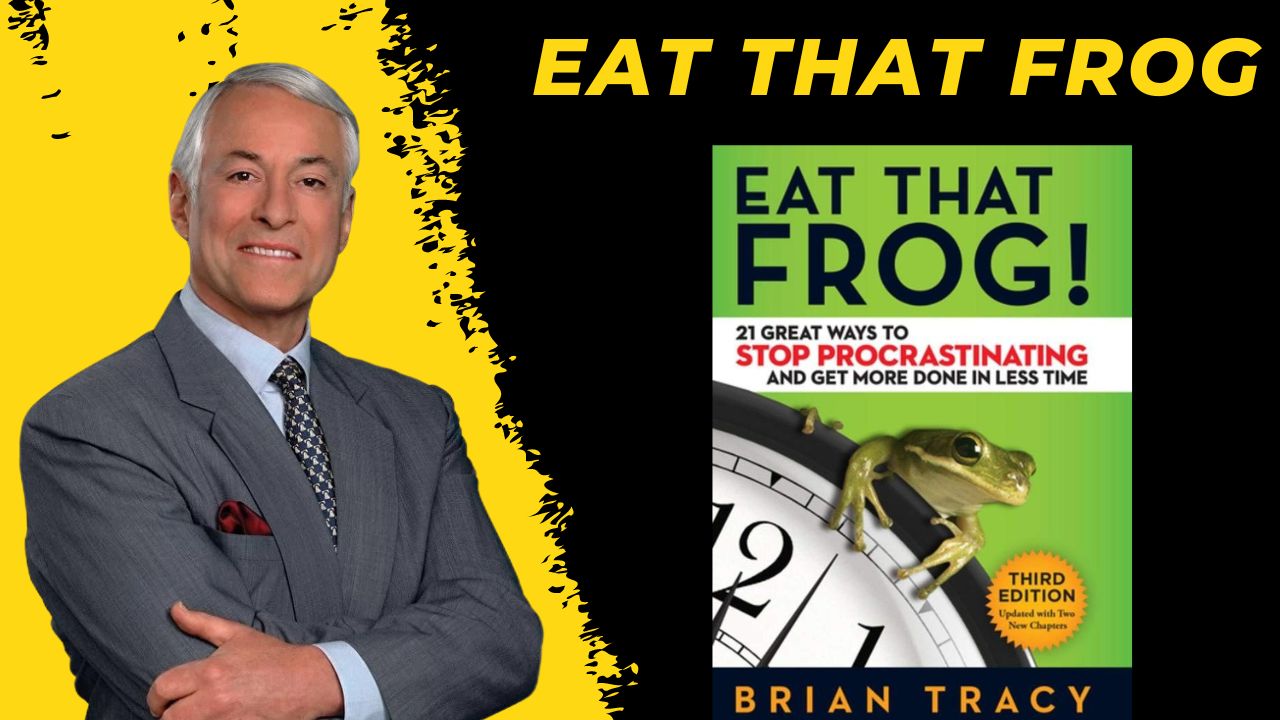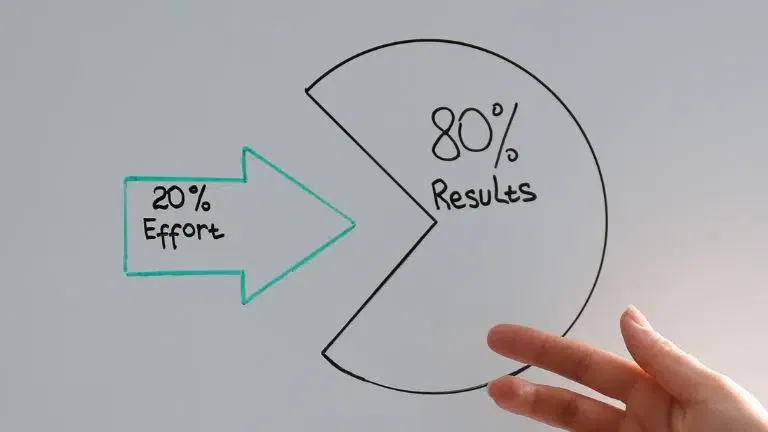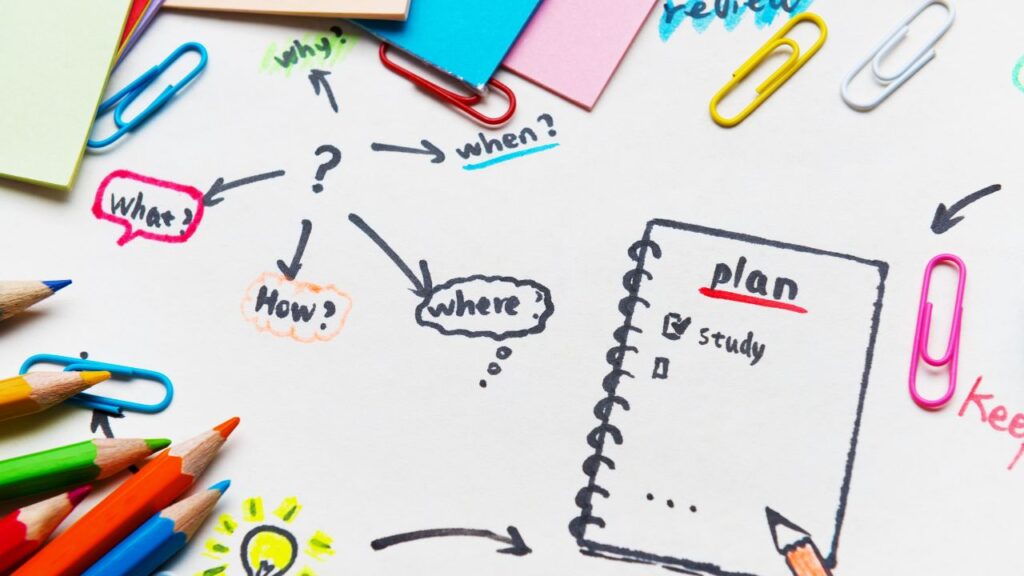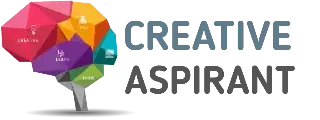We all have an endless list of tasks to complete and have limited time to complete them effectively.
In Brian Tracy’s Eat That Frog, you’ll learn that to achieve more, you must focus on your single most important task and take immediate action.
Tracy’s “frog” analogy is memorable and works well.
What does it offer for you?
Actionable strategies to help you stop procrastinating, prioritize effectively, improve productivity, and achieve more in less time.

- Eat the Frog for a Stress-Free Day
- Six P Formula
- Apply the 80/20 Rule to Everything
- Think On Paper
- Completing Deadline
- Three Important Tasks
- What Is Reducing Our Productivity?
- Slice And Dice Technique
- How Do You Stop Your Frog From Getting Bigger?
- The Magic Of Pre-Planning
- The State Of Flow
- Sense Of Momentum
- Takeaway
Eat the Frog for a Stress-Free Day
Knowing that a difficult task is coming up makes it difficult to focus on anything else. So, getting it done first prevents this distracting tension.
You know that we’re less stressed when we accomplish the assigned task. So doing it as quickly as possible makes us feel more relaxed now that the task is finished.
Let’s understand with an EXAMPLE:
Suppose that you have to eat a frog, and you have to eat it, no matter how much harm it does to your body. You can’t skip it.
If you procrastinate, tension will build. God knows what thoughts you will encounter during this time.
The author offers a solution to escape this kind of situation. He suggests that we write down all the tasks we must do daily and categorize them into A, B, C, D, and E.
- The tasks categorized in A are those you must do, or you’ll suffer the consequences.
- B are the ones that, if not done, can still do you a little harm.
- C are tasks that are good for you, but if you don’t do them, they will not harm you.
- D are the tasks which you can make others do for you.
- E are the useless ones, and you can eliminate them.
‘A’ is like the big frogs you must eat in the morning.
If you have more work categorized in A, you name it A1, A2, A3, etc. Do the other work only after the tasks listed in A are completed.
If you cannot complete all the tasks in one day, you can delay them in C, D, and E because not doing them will not harm you.
Six P Formula
The author explains the 6 p formula: “Proper, Prior, Planning, Prevents, Poor, Performance.”
This means we can prevent poor performance if we plan everything beforehand.
This formula increases our performance and productivity. Planning our day ahead only takes 5–10 minutes, but it also saves us 2 hours.
By planning everything beforehand, we prevent wasting any precious minutes.
- Each evening (or first thing in the morning), take 5–10 minutes to write down your tasks for the day.
- What MUST get done today? What’s important but less urgent? This helps you focus on what matters.
- Do you require any supplies, instructions, or equipment to accomplish these tasks?
- Prepare them now to prevent delays later.
- With your plan in hand, dive into your most important task first.
Apply the 80/20 Rule to Everything
The 80-20 rule, also called the Pareto Principle, says that 80% of outcomes (or outputs) come from 20% of all the causes (or inputs) for any given event. But it does not mean it exactly is 80/20; it may be 70/35, 85/25, or any unequal.
We waste 80% of our time and effort on low-value outcomes, which is why we experience only 20% happiness in our lives. However, we can indirectly increase our happiness by choosing the career or work we like the most.
Here’s how to put the 80/20 principle to work:
- For a few days, write down everything you do. Don’t judge it, just be honest!
- What activities bring you the most joy and success or get you closer to your goals? Circle those.
- Say YES to your top 20% more often. Find ways to say NO to things that don’t really matter as much.
- Focusing on your most important tasks will help you do more, feel happier, and less stressed.
To understand this better, you can read our previous book summary on 80/20 principles.

Think On Paper
All successful people men and women are big dreamers. They imagine what their future could be, ideal in every respect, and then they work every day toward their distant vision, that goal or purpose.
Want to save time and unlock your best ideas? Think on paper. By writing down your plans for the next day, you gain control of your schedule instead of just reacting to it.
Sadly, only 3% of people harness this power.
Writing things down and reviewing your notes regularly forces you to tackle the “big frogs,” your most important tasks. This keeps you focused and on track.
Our mind can create new ideas but isn’t good at storing them. So, we should make it a habit to think on paper.
Let’s know How to APPLY this in Life.
- Write down your short and long-term goals. Make sure they are SMART (specific, measurable, achievable, relevant, and time-bound)
- Carry a notebook or use a note app on your phone to write down ideas, suggestions, or random thoughts.
- Reflect on your experiences, goals, and challenges.
- Stuck on a problem? Grab paper and start writing. Freely brainstorm solutions, pros and cons, next steps, etc.
- Don’t just write and forget. Regularly reviewing your notes keeps your goals and ideas fresh.
- Your plan isn’t written in stone – use it as a guide, but adjust if needed.
Completing Deadline
Many people say they work better under the pressure of their boss or deadlines. However, this is only partially true because not many people can finish their work efficiently in a very short period of time.
For this reason, many people get stressed and make more mistakes in their work; these mistakes can also lead to financial loss.
When you have a deadline, it’s important to plan ahead so that you don’t miss it and have enough time to rest.
Before planning, think approximately how much time you will need to complete that task. If you cannot complete it on time due to an emergency, add 20% extra time. You’ll have that 20% time to complete the work that was left out.
If you want to maximize your productivity, then ask yourself these 3 questions:
- Ques.1 What are my highest-value activities? ( Or what are my biggest frogs?)
- Ques.2 What can I, and only I, do that, if done well, will make a real difference?
- Ques.3 What is the most valuable use of my time right now?
These are the questions you have to answer yourself because they will guide you through the task you’re completing.
Three Important Tasks
This is a real story, or you can say the Author’s experience. When a lady named Cynthia came for his coaching session. She said that she has been working 10–12 hours in her office for eight years and cannot get time for her husband and 2 children.
So, at first, the Author told her to write down all the work she did in her office that week. She came up with 17 tasks that she is responsible for doing.
The author asked her to circle the three most important tasks, which are 90% valuable for her company, and to work on them.
When she went to her office, she discussed it with her boss. Her boss also agreed to this because these three tasks are the most valuable, and she is the best at doing them. Her boss doubled her salary afterward.
Now, she is working less, earning more, and contributing more to her company while spending a good time with her family.
What Is Reducing Our Productivity?
The answer to this question is ‘smartphone’. It can be any other electrical device or gadget. It’s because, in old times, people knew how to make technology their servant, but this generation is letting technology take over them.
Ancient people used technology to profit in business, help others, communicate, and so on. Although some people in this generation also use technology for that purpose only, many people nowadays use it as an entertainment device.
That’s why technology has become the master of our modern society.
We should use it smartly and effectively; otherwise, it can waste time and reduce productivity.
Slice And Dice Technique
This technique is effective when you’re doing any big or complex task because you’re slicing it into small pieces. Likewise, it’s hard to eat a big frog, but when you slice it into small pieces and then eat it, you’ll find it easier to eat that frog.
It’s also psychologically accepted that humans and other creatures find it easier to do a single task rather than the whole thing. You develop a ‘closure to compulsion,’ meaning you feel more happy and powerful if you start and finish work.
When you feel like this, your brain releases a hormone called endorphins.
The more big and difficult tasks you complete, the more endorphins you release. It’s like feeling motivated after eating a big frog. Basically, endorphins reduce stress and uplift mood.
How Do You Stop Your Frog From Getting Bigger?
The key to success is to focus our conscious mind on things we desire not things we fear.
When we do the most important thing, it takes a lot of time. This will help us succeed later on. But many people believe that if they do the small task first, they will have ample time to eat the big frogs later.
But they don’t know that they’re making it bigger by putting off the important task.
Know how to manage your time to eat the big frogs.
For example,
The successful salesperson always completes his/her work on the day decided or on the same day. They never procrastinate.
Every day, they decide on a particular time to manage their calls and data calls. They do this to maximize their output. They discipline themselves to complete their resolutions.
Just like salespeople, some people use discipline to exercise for 30–60 minutes. Even many successful people use this method to read books before the end of dawn, and as a result, they read dozens of books in a year, proving that they know how to eat their big frogs.
The Magic Of Pre-Planning
Many productive people pre-plan their tasks to complete them on time. They also prioritize their most important tasks, producing an effective finished product.
As a result, they become two, three, or five times more productive than others. If you also want to be productive, then use a time planner.
The best way to increase your output is to work in the morning. You can do most of your work at home during those two to three morning hours.
The benefit of doing the work in the morning is that there will be less interruption. You will also see you doing 10 times more productive work at home.
It’s because in the office, you are surrounded by people and phone calls, and the distraction caused by them leads to low performance.
If your work involves smartphones, put all your other gadgets away.

The State Of Flow
The people who rush to complete their work usually do their work on time, but the quality of their work is not good. However, highly productive people use their time to plan and set priorities, then launch toward their goals.
Successful people do their work steadily, smoothly, and continuously, and as a result, their tasks are completed on time with better quality work. On the other hand, an average person spends his/her time in low-value activities like gossiping.
When you do important work with high and continuous focus, you enter a wonderful mental state known as ‘flow’. Almost everyone has experienced this state once in their lifetime.
The state of flow, also known as being “in the zone,” is a mental state of complete absorption in an activity.
- You’re totally immersed in the task at hand, shutting out distractions.
- Skills and challenges are balanced perfectly, making the activity feel effortless and enjoyable.
- You lose track of time because you’re so engaged.
- You’re aware of your actions but not self-conscious.
Flow can happen in many activities, from work and hobbies to sports and artistic pursuits. Simple means doing the thing you LIKE.
When you are in the state of flow, you also experience the highest performance or productivity state of humans. Your mind becomes clear, and everything seems effortless and accurate to you.
You feel happy and energized. You will feel more calm inside, and your personal effectiveness will also increase. In this state, you’ll get brilliant ideas and insights, which will double your work speed.
Sense Of Momentum
When you take continuous action to accomplish your goal, you activate your sense of momentum. This principle says that starting a new work takes a lot of energy, but when you are doing that work, less energy is used.
The good news is that the faster you move, the more energy you have. The faster you move, the more you get done, and the more effective you feel.
The faster you move, the more experience you get and the more you learn. The faster you move, the faster you become capable at your work.
The faster you work and the more you accomplish, the higher your self-esteem, self-respect, and personal pride will be. You will feel complete control over your life and your work.
Takeaway
- Eat your big frogs using the A, B, C, and D methods.
- Use a six-p formula to prevent poor performance.
- Use the 80/20 principle to increase your effectiveness.
- Remember that our mind can generate new ideas but can’t keep them. So, we should make it a habit to ‘think on paper’.
- Don’t think you’ll do better.
- Identify your three most important tasks.
- Make technology your servant. Discipline yourself like a salesperson and Pre-plan your day.
- Improve your productivity by creating a sense of momentum within yourself.
